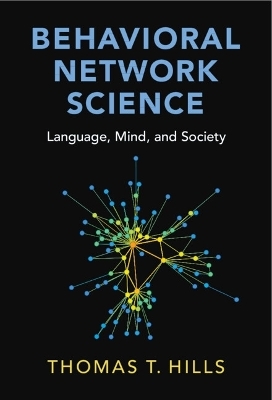
Behavioral Network Science
Cambridge University Press (Verlag)
978-1-108-83540-4 (ISBN)
- Noch nicht erschienen (ca. Dezember 2024)
- Versandkostenfrei innerhalb Deutschlands
- Auch auf Rechnung
- Verfügbarkeit in der Filiale vor Ort prüfen
- Artikel merken
Behavioral Network Science explains how and why structure matters in the behavioral sciences. Exploring open questions in language evolution, child language learning, memory search, age-related cognitive decline, creativity, group problem solving, opinion dynamics, conspiracies, and conflict, readers will learn essential behavioral science theory alongside novel network science applications. This book also contains an introductory guide to network science, demonstrating how to turn data into networks, quantify network structure across scales, and hone one's intuition for how structure arises and evolves. Online R code allows readers to explore the data and reproduce all the visualizations and simulations for themselves, empowering them to make contributions of their own. For data scientists interested in gaining a professional understanding of how the behavioral sciences inform network science, or behavioral scientists interested in learning how to apply network science from the ground up, this book is an essential guide.
Dr Thomas Hills is a Professor of Psychology at the University of Warwick. He directs the Behavioral and Data Science MSc at the University of Warwick, concentrating on how humans represent and navigate information in the mind and society. He has previously held fellowships with the Alan Turing Institute and the Royal Society.
Part I. A Brief Guide to Network Science: 1. Making and recognizing networks; 2. Network metrics; 3. Generative network models and network evolution; Part II. Language and Learning: 4. Zipf's law of meaning: the degree distribution of the mind; 5. Network learning: growing a lexicon by degrees; 6. What is distinctive: exploring edge types in multi-layer networks; 7. The small-world spectrum: using small worlds to compare networks; 8. The birthplace of new words: identifying node origins; 9. Agent-Based models of language emergence: structure favors the orangutan; Part III. Mental Processes: 10. False memories: spreading activation in memory networks; 11. Cognitive foraging: exploration versus exploitation in memory search; 12. Age-related Cognitive Decline: a network enrichment account; 13. Creativity: how noisy processes create novel structure; Part IV. Social Dynamics: 14. Network illusions: how structure misleads us; 15. Group problem solving: harnessing the wisdom of the crowds; 16. The Segregation of belief: how structure facilitates false consensus; 17. The conspiracy frame: coherence through self-supporting beliefs; 18. The Kennedy paradox: games of conflict and escalation; 19. Fund people not projects: a universal basic income for research; References.
| Erscheinungsdatum | 02.10.2024 |
|---|---|
| Zusatzinfo | Worked examples or Exercises |
| Verlagsort | Cambridge |
| Sprache | englisch |
| Themenwelt | Geisteswissenschaften ► Psychologie ► Allgemeine Psychologie |
| Geisteswissenschaften ► Psychologie ► Verhaltenstherapie | |
| ISBN-10 | 1-108-83540-6 / 1108835406 |
| ISBN-13 | 978-1-108-83540-4 / 9781108835404 |
| Zustand | Neuware |
| Informationen gemäß Produktsicherheitsverordnung (GPSR) | |
| Haben Sie eine Frage zum Produkt? |
aus dem Bereich


